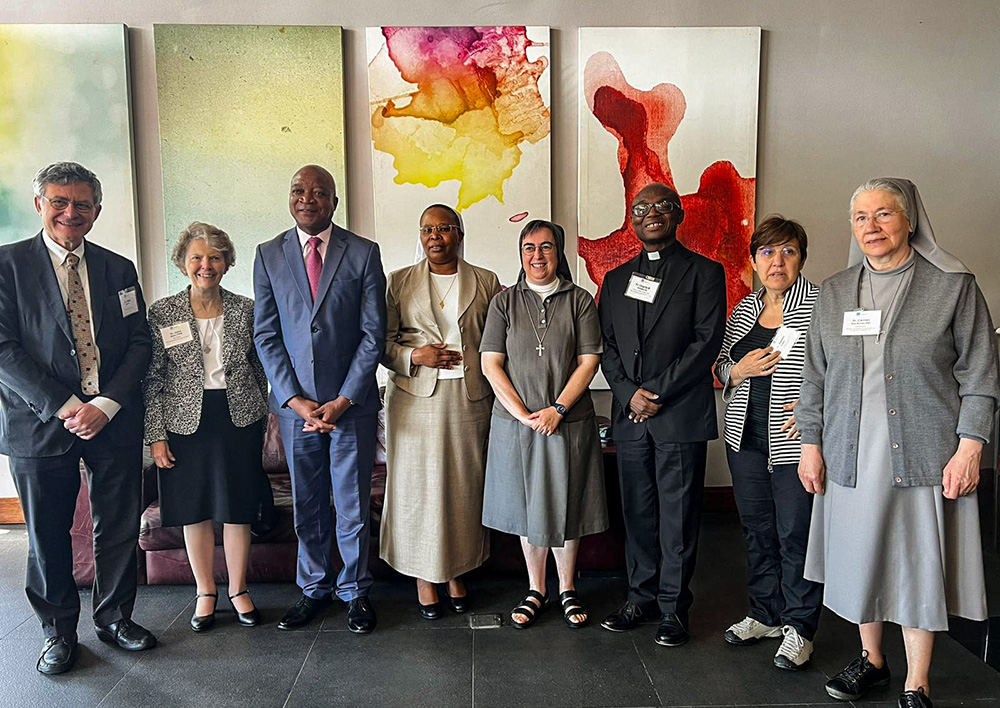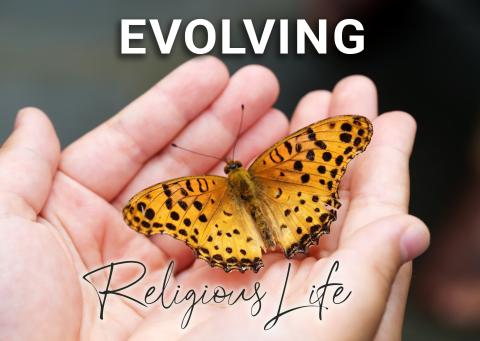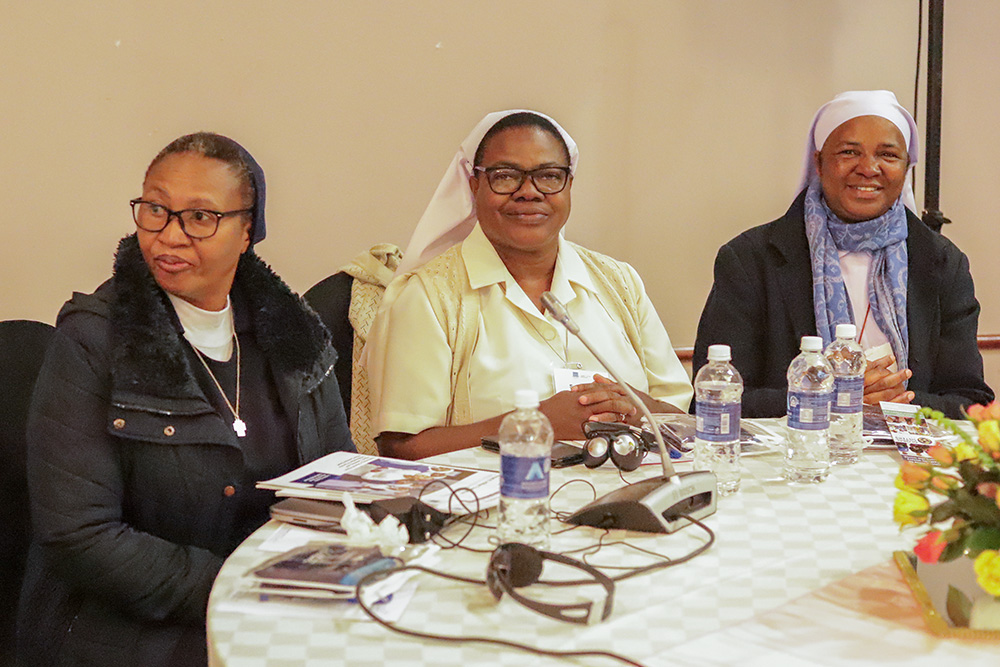
Presentation Sr. Joyce Meyer (second from left) and other participants pose for a photo in Lusaka, Zambia, during the May 29-31 convening of sisters that was sponsored by the Conrad N. Hilton Foundation. (GSR photo)
Editor's note: Evolving Religious Life, a new series from Global Sisters Report, explores how Catholic sisters are adapting to the realities of congregations in transition and new forms of religious life. While we often write about these trends, this particular series will focus more closely on sisters' hopes for the future.

This past May, I had the opportunity, along with GSR African/Middle East correspondent Doreen Ajiambo, to participate in a convening of sisters sponsored by the Conrad N. Hilton Foundation and held in Lusaka, Zambia.
It was a meeting of 120 sisters and partners from many parts of the world. The sisters are leaders in global, national and local partnerships, both secular and church-based. The goals of the meeting were:
- To strengthen efforts to build a global network of sisters;
- To give sisters a voice in many important issues of our world;
- To shed light on the value of building a data infrastructure to track the impact of sisters' services in making the world a more just and equitable place.
Issues discussed included aging and elder care of sisters, anti-human-trafficking efforts, safeguarding, communications, data collection, education, finance and organizational sustainability, religious formation, health care, livelihood development, and various types of leadership.
It was an amazing experience to witness the collaboration and networking, as former siloed attitudes of congregations of women religious were fading before my eyes and morphing into a sense of global sisterhood. Sisters were clearly experiencing the value of sharing and contributing to larger wholes than they knew in their single congregations.
The enthusiasm and creativity were palpable in the variety of panels of sisters and lay partners sharing common dreams, challenges and experiences with issue areas they were working on. They were experiencing an ever-widening view of the world through dialogue with church and local leaders, the significance of advocacy to promote solid community, the value of research and data collection that lead to evidence-informed approaches to the work at hand, and the importance of building networks for increasing impact among those served.

Catholic sisters attend sessions during the gathering for the Hilton Foundation's Catholic Sisters Initiative in Lusaka, Zambia, on May 30. (GSR photo/Doreen Ajiambo)
As I engaged in table conversations and observed the many group activities, I was overwhelmed by a sense of awe and excitement about the evolution of religious life and its significant service worldwide over the past 25 years.
The sisters gathered here were second or even third generation of those I had worked with in the early 2000s. These women are educated, articulate leaders, not only locally but globally. They are making an inestimable impact on their countries and the world by raising their voices for solidarity with those less fortunate and bringing communities along with them.
I also felt intense gratitude to have been part of this evolution. My excitement took me back to the journey I had with sisters internationally.
It started when I spent five years as a missionary to Zambia in 1981-86. It was not intentional to work with sisters, as I initially went as a teacher of English to Kasiya Secretarial College. However, I was fortunate, because of my educational background, to be asked to participate occasionally in some of the programming at the Kalundu Study Center being administered by Franciscan Missionary Sisters for Africa.
This center had been initiated to provide training for sisters who would be formators of young women entering their religious congregations. This work introduced me to a whole new world of religious life and sisters from all over Africa. It was exciting and amazing, and definitely my first time meeting women aged 25-30 who were working with bishops in founding new indigenous congregations.
Advertisement
This intermittent work became a full-time venture when, at the end of three years at Kasiya college, I was hired to the position as secretary for the Zambia Association of Sisterhoods, where I managed the conference activities and gave courses on religious life to young sisters in the various congregations throughout Zambia and neighboring countries.
After two and a half years in this role, I was called home for the next 12 years to be part of our congregational leadership. I then applied and was hired for the position of executive director of Conrad N. Hilton Fund for Sisters. (Conrad N. Hilton Foundation is a major funder of Global Sisters Report.)
The mission of the fund was to receive applications and award funding for sisters' development projects throughout the world. Our focus, because of the 2000 United Nations Millennium goals, was on least-developed countries. So, most of our work was with indigenous congregations, many newly founded, living and working in remote rural areas because that was where there was greatest need.
The fund was new to sisters in most countries, having only been established in 1986. My task included introducing the fund to sisters worldwide but also monitoring where and how the grants were used.
As I visited projects in these remote areas, I was constantly amazed at the resilience and creativity of these women. Most worked in parishes or engaged in small congregational education, social or agriculture projects, and had few if any resources, so grants were like manna from heaven.
But newness also brings challenges. The majority of sisters in rural remote regions of their countries knew very little English unless they were citizens of countries where English was a national language, and they worked primarily with people speaking native languages. And, yet, from our fund side, we required them to submit grant applications in English — not the only barrier. They had to type the answers, then cut and paste them into the forms and send them by post.
Along with these technical issues was the fact that few had any experience in the language of budgeting or finance. This meant teaching the meaning and purposes of budgets and accounting, along with reporting how the funds had been used. There were no computers, only fax machines, and the internet was only a dream in the future.
Many sisters in those years had limited education. Young women entered religious life after seventh or eighth grade but may have been 16 or 17 years old, or if fortunate, attended high school until grade 10. Those with grade 10 could attend teacher or nurse training. One of our initiatives was to offer grants for sisters to complete high school to provide possibility for university study.
During the 12 years I was director, many changes took place. Organizations became aware of the need for sisters' tertiary education and found ways to provide funds for computers and training. This began the miracle of the sisters' technological expertise.
When cellphones arrived on the scene, things changed dramatically. Here, at our meeting, no one was without a phone for international communication and education possibilities.
This is only a brief story of the unimaginable strides international sisters have made and how their access to education and training have impacted the development of their countries, spiritually, socially and economically. I keep wishing there were some way to have their countries and our church recognize the value of these women.
And now as they partner with others, their impact will only grow. I left the meeting with great hope and confidence that these women, working together, will fulfill the goals of the gathering and make even more dramatic changes for the betterment of our societies worldwide.







